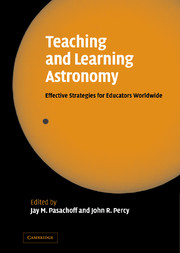Book contents
- Frontmatter
- Contents
- List of illustrations
- Preface
- Introduction
- Part I Astronomy in the curriculum around the world
- Part II Astronomy education research
- Part III Educating students
- Part IV Educating teachers
- Part V Astronomy and pseudoscience
- Part VI Astronomy and culture
- Part VII Astronomy in developing countries
- Part VIII Public outreach in astronomy
- Part IX The education programs of the International Astronomical Union
- Introduction
- 21 A short overview of astronomical education carried out by the IAU
- Part X Conclusions
- Author index
- Subject index
Introduction
Published online by Cambridge University Press: 18 May 2010
- Frontmatter
- Contents
- List of illustrations
- Preface
- Introduction
- Part I Astronomy in the curriculum around the world
- Part II Astronomy education research
- Part III Educating students
- Part IV Educating teachers
- Part V Astronomy and pseudoscience
- Part VI Astronomy and culture
- Part VII Astronomy in developing countries
- Part VIII Public outreach in astronomy
- Part IX The education programs of the International Astronomical Union
- Introduction
- 21 A short overview of astronomical education carried out by the IAU
- Part X Conclusions
- Author index
- Subject index
Summary
The International Astronomical Union (IAU) was founded in 1922 to “promote and safeguard astronomy … and to develop it through international co-operation.” There are currently (2005) 9,014 individual members in 87 countries. The IAU is funded through the adhering countries, and is administratively “lean.” The total staff consists of a secretary and an assistant. The officers serve voluntarily, usually with support from their academic institutions. Almost all of the funds supplied from the dues are used for the development of astronomy.
One of the 40 IAU “commissions,” or interest groups, is Commission 46, formerly called “The Teaching of Astronomy,” and more recently, at the 2000 General Assembly, renamed “Astronomy Education and Development.” It is the only commission that deals exclusively with astronomy education; a previous Commission 38 (“Exchange of Astronomers”), which allocated travel grants to astronomers who need them, and a “Working Group on the Worldwide Development of Astronomy,” have been absorbed by Commission 46. The 40 commissions, and the many working groups, were recently organized into 11 scientific divisions. Commission 46 is part of a 12th division, “Union-wide Activities,” which deals with issues of concern to all IAU members.
The commission's mandate is “to further the development and improvement of astronomy education at all levels, throughout the world.” In general, the commission works with other scientific and educational organizations to promote astronomy education and development; through the national liaisons to the commission, it promotes astronomy education in the countries that adhere to the IAU; and it encourages all programs and projects that can help to fulfil its mandate.
- Type
- Chapter
- Information
- Teaching and Learning AstronomyEffective Strategies for Educators Worldwide, pp. 247 - 248Publisher: Cambridge University PressPrint publication year: 2005



